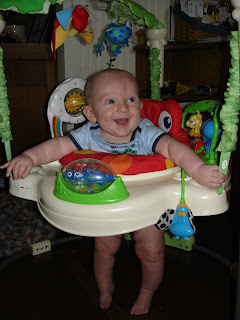Your beautiful five-month-old baby boy, who has been the most perfect little angel since birth, has suddenly turned into a cranky, fussy, drooling, chews-on- everything-in-site little monster! He is now keeping you up half the night, and needs to be held, bounced, and nursed all day long. Welcome to the wonderful world of TEETHING!"
Thankfully,
 Emerson's personally taken care of his need "to be bounced," as he's fallen in love with his new toy, the "jumperoo" which was loaned to us by our friend Sarah when we were back in Indiana last weekend (she also recommended Hyland's Teething Tablets which has been a huge help!). Seriously, this kid LOVES to bounce in this thing. Yesterday, he probably spent two hours in it. He jumped so much that he got a blister on his big toe! But don't think we're being neglectful parents - what he loves more than bouncing is knowing someone is watching him bounce! In fact, yesterday when he was bouncing, I would look over at him every few seconds and he would just burst out laughing (he'd even throw his head back and cackle. It was hilarious!). He thinks its really funny too when I jump with him.
Emerson's personally taken care of his need "to be bounced," as he's fallen in love with his new toy, the "jumperoo" which was loaned to us by our friend Sarah when we were back in Indiana last weekend (she also recommended Hyland's Teething Tablets which has been a huge help!). Seriously, this kid LOVES to bounce in this thing. Yesterday, he probably spent two hours in it. He jumped so much that he got a blister on his big toe! But don't think we're being neglectful parents - what he loves more than bouncing is knowing someone is watching him bounce! In fact, yesterday when he was bouncing, I would look over at him every few seconds and he would just burst out laughing (he'd even throw his head back and cackle. It was hilarious!). He thinks its really funny too when I jump with him.So yeah, our lives have been a bit chaotic these days (without a teething child!). This weekend, we spent a lot of time trying to get our house/lives organized as my first day back to class was today. Saturday, we cleaned up Emerson's room, reorganized the basement, and finally got a light bulb for the garage. Then, our washing machine broke. We buy a new house, and three weeks later--three weeks after we sold our previous washing machine because we didn't think we'd need it!!--our washer breaks. Ugh. So, we get on Craig's List, checked out the local Sear's Scratch and Dent store, and sent out a bunch of emails to possible sellers.
Then, on Sunday, after refreshing the Craig's List page about every half hour, I located a steal of a washing machine -- a DIGITAL washer for only $50! And, I was the first to respond! Woohoo! Now, I only had to pick it up...and find a truck to do so. I asked around at church and started making some phone calls but had little leads. On top of that, on Sunday afternoon, our friend Sean helped me saw our box springs in half (it was the only way to get them upstairs - we've been sleeping on our mattress on the floor for three weeks!) and put them back together, fought an enormous swarm of yellow jackets (I used an entire can of Raid, and there are still TONS of them around), and even watched the Cubs win a game for once...So much for Sabbath.
I scheduled to get the washer Monday night (tonight) and then this morning, suddenly realized that Amber was scheduled to work. Not only did I need to find a truck, I needed to find a babysitter, and a helping hand to get the washer home! So I did what any good social networker would do : I sent out the need via Facebook status! And I emailed nearly everyone in my philosophy department. Even then, I didn't get much response (which is simply evidence that none of our friends own trucks!), but I got what I needed. Even better, I got a "one stop shopping" -- all three of my needs were fulfilled by one family (thanks Kevin and Steph!). So, we got the washer and got back in less than an hour. And there, when we got back to my friend's house, was my screaming, teething, and extremely tired little (cute?) Monster. Poor kid. Really, all he needed was a good, long nap (sounds familiar, eh?). In fact, he fell asleep in the car within seconds. Oh, and we've discovered that when he's really upset, he makes a verbal utterance that sounds exactly like "mama." Don't think he quite knows what it means yet, but I don't think its a coincidence either.
So that's been our crazy last few days. Oh, and somehow amidst all of this, I also went to my first class of the semester today. It was actually quite good, considering so much of today was a big blur. Anyways, gotta go get the cloth diapers out of our new washer and into the dryer - and go to bed!




